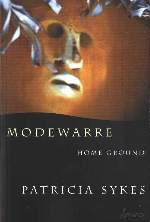 Modewarre: home ground by Patricia Sykes
Modewarre: home ground by Patricia Sykes
Spinifex Press, 2004
In spite of poetry's continued insistence on its own marginality, its retreat into abstract stylistic expression or into words that act as anaesthetic or lullaby, there is still the possibility that words can undermine the way things are. The writer 'merely' needs to assume the impossible, to make it possible. In Modewarre: home ground Patricia Sykes displays this hope.
The poems read like the result of a search through personal memory and official records; the protagonist turning over in her hands remnants of family, home, language and bodies, human and non-human, and holding them up to the light of the future.
Modewarre is a small town in Victoria, Australia; twenty kilometres southwest of Geelong, surrounded by sheep and dairy farms. It is also the Wathaurong word for musk duck, the large ebullient water bird – large enough, it's said, to have been mistaken for the famed bunyip. In these poems Sykes circles, tiptoes around and examines the duck, examining her, while attentive to what the duck might have to say in return about us humans. The poet is concerned with the duck as symbol, but also with the actual living duck, and how the two are related.
This is Sykes' second collection, following Wire Dancing (also Spinifex Press, 1999). While the political consciousness at its heart is the same, Modewarre: home ground is clearly a thematic and stylistic step forward. In this racing forward, she does seem to trip up here and there, but the risk of the venture gives the poems' emotional tone a maturity and humility which is entirely appropriate for the experiences being unearthed.
Sykes appreciates the fissure between language and the world as it is, and is keen to communicate this appreciation to us. At times this is done quite movingly, and with an almost risky bareness, as in the opening lines of the book:
because the syllables
on the page are not
the land beneath the namebecause a childhood memory
of place is not the same lake
upon which the duck floats(`Modewarre – ways you might approach it')
This poem exemplifies the strengths of the collection. The actual duck is focussed upon, within her context, and the traditional way of looking is unsettled. Epiphanies threaten to break into these poems at any time, coming through rarely, and expressed fleetingly, rather than squeezed dry, leaving a long resonance:
the soft dopple each of them makes
in their feeding dives a way to cut
water open without forcing a wound(`sanctuary: Swan Lake, Philip Island')
Overall, capitalisation is eschewed, and punctuation minimised. I take this not to be a poetry self-consciously humbling itself, but the internal grammar of an enthusiastically curious mind. The rhythms and word-sounds chosen are subtle, utilitarian, supportive of an overall perspective that is passionately life-affirming. Pointed questions are asked, and answered tentatively or rhetorically, if at all. Usually, though not always, Sykes leaves the dots unjoined for us, though close enough together to keep us thinking of important questions:
or is this just a voice
from the dark matter
of fearafraid of reach
and plot-based ambition?
as if should the eagles fall
so will the piercing eye(`eupathy')
There are moments where the voice comes across as too detached, as if it were attempting the view-from-nowhere. Interestingly, it is predominantly within the `House of Detention' section, where the lens pulls out to examine broader and more explicit political concerns, that this happens. Some phrases seem self-consciously contemporary – metaphors can appear strained, as in `dura mater' (“of a perfect humanity, how it pours // through the red stab in the abdomen / compassionate as money”), and sound can swallow meaning, as in `hard garbage'. While these may be attempts at integrating the chasm between language and reality within the structure of the poems themselves, some of these later poems crank up the style past the point which the heart of the book can handle. Fortunately, these moments are rare.
They also serve to emphasise the qualities of the poems and sequences where this 'rush poetry' is most persuasive – `Modewarre, ways you might approach it', `sanctuary: Swan Lake', `Philip Island', the `Duck Psalms' and `flamingo, flamenco'. These poems offer spare, rich images, and gently provocative thoughts. They hint at alternatives, while respecting the reader's ability to develop their own.
Overall, this intriguing and seductive collection, centred around the fraught approach towards the intimate and the unfamiliar, and shows a breadth of feeling and political implication revealingly absent from much poetry focussed on 'the Other'. This is the sort of writing that we need now. Sykes has the skill and heart to tackle the task – much of Modewarre: home ground proves it.
Read Andy Jackson's interview with Patricia Sykes.
Andy is 33, physically unusual due to Marfan Syndrome, and a writer, recently published in Salt-Lick, Going Down Swinging, Space New Writing, and The Ardent Sun, and online in Hutt and Big Bridge. His most recent collection of poetry is Aperture, which includes a CD of collaborations with musicians, and he is currently working on another with a grant from the Australia Council. He lives in Melbourne.













